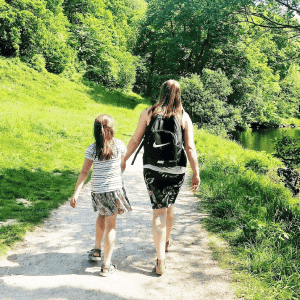How challenging is it to raise young children in the age of Insta’ and YouTube? We spoke to Lucy mum of 2 to find out.

When it comes to online safety Lucy says she takes a cautious approach and believes that parents must get involved in helping children learn online safety from a young age.
School online safety policies
Many schools aren’t up-to-date with their policies and understanding, says Lucy. “I just looked at our school’s policy and I suspect it’s very old, as it talks about floppy disks and has no mention of social media,” she says. “This is worrying because schools need to be preparing children for the digital age and make sure there are policies, even if they’re technically too young to use it.”
Lucy believes that teaching must start long before children are old enough to use the internet independently, so the rules of safety are ingrained by then. “I also think we can model safe behaviour for them,” adds Lucy. “For example, a teacher could upload a photograph to the class blog, but explain why they’ve blurred out a child’s name, to protect their personal information.”
Concerns around sharing images online
In the past, Lucy has had concerns about the amount of information shared by schools and other youth organisations. For example, putting children’s faces on the school Twitter and Facebook accounts. “I used to run a toddler group Facebook page and regularly blocked people who wanted to follow the page but weren’t parents, and followed dozens of other child-related pages,” she says.
Although there is always pressure for children to “fit in” at the moment Lucy’s children are too young to have mobile phones. When that time comes, Lucy says she will try and strike a sensible balance. “School can be miserable if you’re being teased, and it’s hard to learn in that environment. But I also want to support them to make their own choices and be individuals.”
Going social at primary school
The children use DB Primary in school once they reach Year 3, and Lucy’s eldest daughter has her own children’s tablet. “It has educational games on it, and very limited Internet access,” she explains. “I think it is important for children to develop their knowledge of technologies like this so that they are not left behind.”
Ground rules and tips
At home there are rules around tech time, such as 45 minutes of screen time per day, all devices are kept in public rooms, and no devices may be used during meal times. “I find if they have too much TV or tech time, they get grumpy, and after dinner, we don’t allow devices as it’s calm downtime,” says Lucy.
Raising children in 2018 is definitely not easy, says Lucy. “We’re the first generation of parents to try and navigate this 24/7 world of distractions and it’s hard to know how much is too much,” she says. “My big tip to parents is to talk to parents long before they get mobile phones, and be aware of the behaviour you’re modelling as a parent.”
Lucy also recommends using sites such as Common Sense Media to get advice about films and computer games. “It’s a great way to check up if your child is consuming age-appropriate content.”
More to explore
See our back to school online safety guides
Download and watch age-specific online safety tips
Visit BBC Own It resource for children resource to help them navigate the online world
The post Helping young children navigate the online world – a parent’s experience appeared first on Internet Matters.


